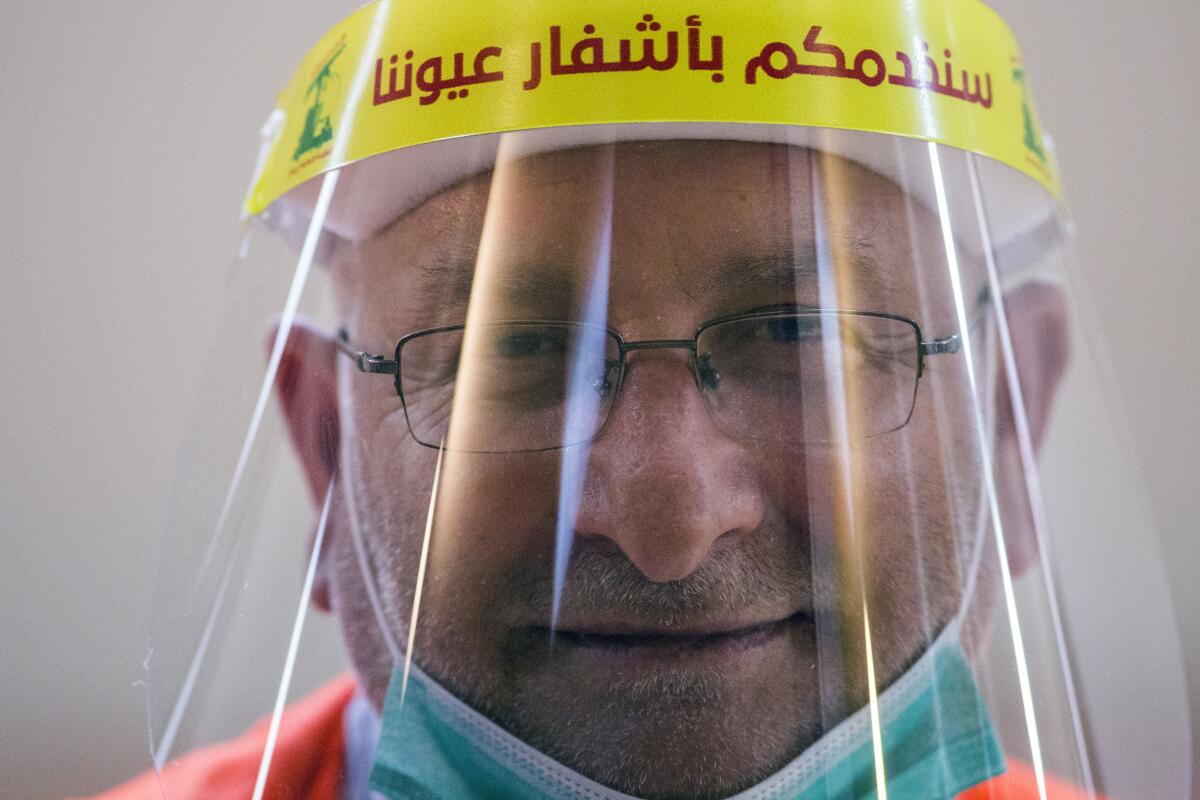Iran, Venezuela and other U.S. foes fight coronavirus amid American sanctions

- Share via
BEIRUT — Hezbollah, the Iran-backed Islamic faction in Lebanon deemed a terrorist group by the U.S., has decades of experience fighting wars. But not the kind it launched this week.
Armed with red, yellow and green Hezbollah flags and face masks decorated with the same colors, thousands of doctors, nurses and medical technicians began mobilizing to battle a new adversary: the coronavirus.
But Hezbollah, along with the governments of Iran, Venezuela and others, is facing the pandemic at the same time it lurches under the weight of harsh U.S. economic sanctions that have blocked its access to money, imports and international alliances. Now as virtually every country in the world grapples with the health crisis, the American pressure campaign against its foes is drawing attention.
Venezuelan President Nicolas Maduro, whom the Trump administration has been trying to oust for more than a year, accused the U.S. Tuesday of “inhumane” exploitation of the coronavirus crisis, using it as a way to corner him and his Socialist government. U.S. sanctions have been levied against numerous Venezuelan officials, businesses and its lifeline, oil production.
Venezuela is only beginning to detect cases of COVID-19, the highly infectious disease caused by the novel coronavirus, and its collapsed health system is woefully ill-equipped to treat an onslaught of victims, residents say. Without ventilators, medicines, water and sometimes electricity, the best some hospitals have been able to offer is hand sanitizer.
The Trump administration last week tightened its sanctions, adding more Venezuelan officials to its blacklist, which bars them from doing business with U.S. citizens and companies. And the Justice Department indicted Maduro and more than a dozen members of his inner circle on drug-trafficking and related criminal charges.
On Tuesday, Secretary of State Michael R. Pompeo offered a carrot, saying the U.S. would gradually lift sanctions if Maduro stepped down and dissolved several of the governing bodies he dominated, including the Constituent Assembly, a largely rubber-stamp legislative chamber. The deal would include forming a five-member transitional government that would hold elections within nine months.
Maduro quickly rejected the offer and vowed his country would withstand the pandemic with aid arriving from China, including 55 tons of testing equipment, masks and protective gear, respirators, antiviral medicines and X-ray machines.
Iran, similarly, has lashed out at Washington, blaming sanctions for tying its hands in fighting the disease.
Iran has officially counted more than 3,000 deaths after initially downplaying and concealing the impact of coronavirus and bungling its countermeasures.
Javad Zarif, the foreign minister of Iran, accused the United States of engaging in “medical terror.” He posted a tweet with the word SANCTION in big red block letters, with the O formed by an image of the virus that’s become emblematic of the pandemic.
State Department spokeswoman Morgan Ortagus responded angrily to Iran’s claims. “Stop lying. Stop stealing,” she tweeted. “It’s the regime, not the sanctions.”
The United Nations, international human rights organizations and a handful of U.S. lawmakers are calling on Washington to ease the sanctions to make it easier to cope with the crisis.
“The United States should not now be in the business of compounding the pain and suffering of the people of Venezuela and Iran, piling in on top of what the mismanagement [by Caracas and Tehran] has already created,” said Peter Harrell, a fellow at the Center for a New American Security who helped develop sanctions against Iran under President Obama.
A letter signed by nearly three dozen mostly progressive members of Congress urged Trump to pause the sanctions. “We can’t forget this is a global pandemic that requires American leadership,” said Rep. Joaquin Castro (D-Texas) in a statement supporting the letter.
The Trump administration has refused, noting that U.S. sanctions do not apply to medicines or most other humanitarian aid.
Although that is technically true, by roping countries off from the international economy, sanctions make it extremely complicated to supply humanitarian aid, said Richard Nephew, a sanctions expert formerly at the State Department and National Security Council. The licensing systems and other mechanisms that the U.S. has made available for obtaining humanitarian equipment are confusing and burdensome, and few banks are willing to deal with capitals that Washington holds as pariahs.
Some critics argue that the Trump administration may be hoping that the burden of the coronavirus crisis will be the final straw that topples the governments of its most hated enemies.
In announcing the indictments of Maduro and his associates, Atty. Gen. William Barr said the move during a health crisis was well-timed because it might persuade Venezuelans to finally rise up against their leaders. “The people in Venezuela are suffering, and they need an effective government that responds to the people,” Barr said. “This is the best way to support the Venezuelan people: to rid this country of this corrupt cabal.”
Pompeo denied that the U.S. was exploiting the health crisis, saying the administration has even offered medical aid to those governments but that they refused it. He also suggested the administration could yet reconsider easing the sanctions at some point.
“We evaluate all of our policies constantly,” Pompeo told reporters this week. “So the answer is, would we ever rethink it? Of course. We’re constantly trying to make sure we have our policies right.”
Staff writers Bulos and Wilkinson contributed from Beirut and Washington, respectively. Special correspondent Mery Mogollon contributed from Caracas.
More to Read
Get the L.A. Times Politics newsletter
Deeply reported insights into legislation, politics and policy from Sacramento, Washington and beyond. In your inbox three times per week.
You may occasionally receive promotional content from the Los Angeles Times.












